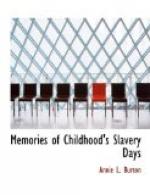We hoped the talk was most ended, for we were anxiously watching that pot. Pretty soon my mother seemed to realize our existence. She exclaimed, “My Lord! I suppose the little children are nearly starved. Are those pease done, young ones?” She turned and said to the white woman, “Have you-all had anything to eat?” “We stopped at a house about dinner time, but the woman didn’t have anything but some bread and buttermilk.” My mother said, “Well, honey, I ain’t got but a little, but I will divide with you.” The woman said, “Thank you, Auntie. You just give my children a little; I can do without it.”
Then came the dividing. We all watched with all our eyes to see what the shares would be. My mother broke a mouthful of bread and put it on each of the tin plates. Then she took the old spoon and equally divided the pea soup. We children were seated around the fire, with some little wooden spoons. But the wooden spoons didn’t quite go round, and some of us had to eat with our fingers. Our share of the meal, however, was so small that we were as hungry when we finished as when we began.
My mother said, “Take that rag and wipe your face and hands, and give it to the others and let them use it, too. Put those plates upon the table.” We immediately obeyed orders, and took our seats again around the fire. “One of you go and pull that straw out of the corner and get ready to go to bed.” We all lay down on the straw, the white children with us, and my mother covered us over with the blanket. We were soon in the “Land of Nod,” forgetting our empty stomachs. The two mothers still continued to talk, sitting down on the only seats, a couple of blocks. A little back against the wall my mother and the white woman slept.




